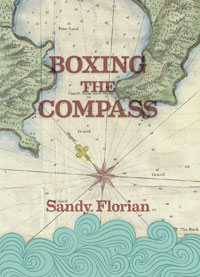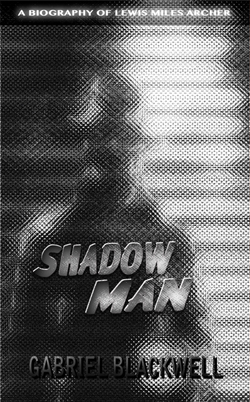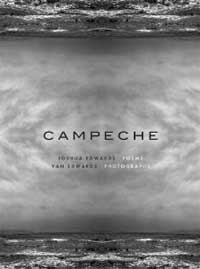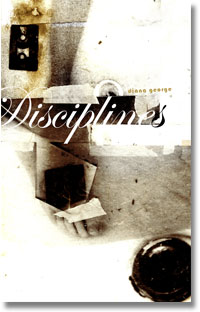Mourning into Joy: Boxing the Compass by Sandy Florian
 Boxing the Compass
Boxing the Compass
by Sandy Florian
Noemi Press, 2013
114 pages / $15 Buy from Noemi Press or Amazon
If Sandy Florian’s novella Boxing the Compass is the answer, then the question might be: is the era of climate change spawning a specific literature? Some exploration of this question will lead us into the astonishing work of mourning Boxing the Compass is.
Ironically, the phrase Homo sapiens is Latin for “wise man.” Like all species, the existence of Homo sapiens has always been finite. No divine favor, cognitive privilege, or technical fix has ever exempted Homo sapiens from eventual extinction. None ever will. Climate change just promises to turn this “eventual” extinction into an uncomfortably close event. In 2010, the renowned Australian microbiologist Frank Fenner hypothesized Homo sapiens will go extinct within a century. Entertain Fenner’s hypothesis, and then try to write a book for the ages: for at most two or three generations more.
Whatever else climate change is, it is an event in language. The extinction of myriad species of fish should make writers differently aware of the biotic referents of tropes such as “to spawn a literature.” Extinctions bring about irreversible absences. The prospect of the extinction of Homo sapiens draws language into a hurricane swirling words up and away, or down and out, from anthropic referents. What happens to words as their referents irreversibly disappear? In becoming bereft of their referents, words may kindle mourning. Within language, climate change is metamorphosing frighteningly many words into words of mourning.
Imagine a novella catching intimations of the oceans in their terrible fragility as sustainers of life by narrating a daughter in mourning for her mother. Imagine that, through the daughter’s grief, this novella allows the mourning climate change solicits in language to find articulation. With these imaginings, we arrive at Sandy Florian’s uncanny work of mourning, Boxing the Compass.
June 10th, 2013 / 11:00 am
Weston Cutter interviews Gabriel Blackwell
 I’m a huge admirer of Gabriel Blackwell — as prose editor at Noemi Press, I’m publishing his book of short fiction Critique of Pure Reason very soon, and I’ve published a piece of his body of work in almost every venue I’ve gotten my hands on. What I mean to say is that I can vouch for him as a writer and as a human being, and that you should also check out his novel Shadow Man, about which Weston Cutter has interviewed him. Here is Weston’s introduction, and their interview:
I’m a huge admirer of Gabriel Blackwell — as prose editor at Noemi Press, I’m publishing his book of short fiction Critique of Pure Reason very soon, and I’ve published a piece of his body of work in almost every venue I’ve gotten my hands on. What I mean to say is that I can vouch for him as a writer and as a human being, and that you should also check out his novel Shadow Man, about which Weston Cutter has interviewed him. Here is Weston’s introduction, and their interview:
Gabriel Blackwell’s Shadow Man: a Biography of Lewis Miles Archer arrived in black and white. I mean that both the galley copy was not full color, and that the book offers itself as a thing in or amidst a noirish fog, like some old cinematic masterpiece. Here’s how it starts: “Lewis Miles Archer, or anyhow the man known to creditors and clients as Lewis Miles Archer for just long enough to build up a respectable sheet of both, was born sometime between 1879 and 1888, somewhere in the shadow of Lake Michigan.” What Blackwell’s doing with this sort of dancing-away imprecision (four different states, for instance, could claim regions in the shadow of Lake Michigan) is crafting a slippery-but-detailed-as-possible biography of a fictional character. What actually happens to you as you read is you feel the line between ‘real’ and ‘fiction’ slipping, twisting and going porous in ways that, at least to this reader, become unsettling in fantastic ways: one less reads Shadow Man than goes into it and, later, comes out from it. It’s a hell of a thing. Gabe and I recently batted a single round of questions back and forth, hoping we’d get into more questions but then, after the first round, realizing 1) we’d gotten done what we’d hoped and 2) life intrudes.
Weston Cutter: Were there any rules in how you composed this book? In other words, did you keep 100% fidelity to the fictiveness of fiction and the ‘reality’ of reality? And how did this book end up taking the form it did? I guess mostly this question’s one rooted in fascination, one writer to another saying: how the fuck did you even find the trail that let you even begin to walk toward the result that is this book? How does one do that?
Gabriel Blackwell: I don’t think I thought of them as rules, but I guess they could be viewed that way—I created none of my characters and tried as much as possible to put the events from my texts (Raymond Chandler’s The Big Sleep, Dashiell Hammett’s The Maltese Falcon, and Ross Macdonald’s The Moving Target) into new contexts rather than invent other events to suit the narrative. But those didn’t seem like rules—I was just trying to write a book that worked in the way that I wanted this book to work. Shadow Man, which has to do with inheritance and imitation, needed to be a node rather than a terminal, a book that pointed outside of itself in constructive ways. I like lots of terminal fictions, books that assert that what they are describing is to be believed for the duration of their story and no further, books that begin and end inside the author’s head. But it’s rare that I’m actually caught up in those books; I’m always conscious of the writer playing house with me. That tends to take me out of it. I don’t want to read a transcript of someone playing with paper dolls, not if it isn’t really compelling. READ MORE >
There will be nothing left here but the sea
 Campeche
Campeche
Poems by Joshua Edwards
Photographs by Van Edwards
Noemi Press, 2011
112 pages / $15 Buy from SPD
In the national artistic dialogue, there are usually but two coasts: East and West. The Gulf Coast barely enters the radar screen and, when it does, it’s normally because of a great tragedy like Katrina or the BP Horizon disaster. A chance for artists to express their solidarity or disgust or anger or sadness or pity.
September 9th, 2011 / 12:00 pm
Contesting Contests: A Conversation
A while back, I posted a link to Les Figues Press’s very first book contest. Whereas all I did was post the submission information, many commenters responded, asking questions and giving opinions about contests in general. To clear up any questions about motivation, profit margins, etc, I have assembled four small presses – Les Figues Press, Starcherone Books, Noemi Press, and Fiction Collective 2 – to discuss their contests. I hope you find this conversation as illuminating as I do.
Bios for the presses can be found after the conversation. The publishers representing the presses are as follows:
Les Figues Press (LFP) – Teresa Carmody
Starcherone Books – Ted Pelton
Noemi Press – Carmen Gimenez Smith
Fiction Collective 2 (FC2) – Lance Olsen
Note: You may notice an exclusion in the conversation here, that is, I didn’t ask anyone to represent a press who doesn’t have a contest. I had considered asking a few people, but ultimately, I wanted to focus on why presses have chosen to run a contest. Expect a post within the next few weeks with presses who have chosen not to run a contest, for whatever reason. Hey publishers: if you have a press that doesn’t run a contest and want to participate in a conversation like this one, email me: Lily [dot] Hoang [dot] 326 [at] gmail [dot] com.
LH: How long has your press run a contest, and what was your rationale in starting it? Do you require a submission fee? With the submission fee, does the applicant get any other goodies?
6 Different Languages all on the Same Block: An Interview with Shya Scanlon
 Released earlier this year from the magnificent Noemi Press, Shya Scanlon’s full length print debut In This Alone Impulse, is truly of thing of many things. Using 7 line blocks of language to evoke a sublimely confounding string of styles, voices, jokes, murmurs, machines, Scanlon has truly forged from a seemingly simple set of building blocks a highly tuned and deceptively challenging machine of language and idea.
Released earlier this year from the magnificent Noemi Press, Shya Scanlon’s full length print debut In This Alone Impulse, is truly of thing of many things. Using 7 line blocks of language to evoke a sublimely confounding string of styles, voices, jokes, murmurs, machines, Scanlon has truly forged from a seemingly simple set of building blocks a highly tuned and deceptively challenging machine of language and idea.
For a taste, check out Shya’s YouTube feed, which features short videos of a wide range of folks reading sections from the book. Here’s a rather rad one by A.D. Jameson, performing, ‘Hansom’:
Over the past few weeks Shya and I talked some about the construction of the book, its influence, becoming, tone, approach, as well as some of his other forthcoming works.
July 14th, 2010 / 11:10 am
Win Diana George’s DISCIPLINES
 I have an extra copy of Diana George’s DISCIPLINES, an amazing fiction chapbook from Noemi Press, who continues to do more and more amazing things.
I have an extra copy of Diana George’s DISCIPLINES, an amazing fiction chapbook from Noemi Press, who continues to do more and more amazing things.
I read this chapbook and couldn’t shake the verbiage from my head, still haven’t really. It is in the Lish-mind (the chapbook has a Gary Lutz blurb), and is about rooms and weird ritualistic behavior, and modes of study. The stories are kind of hard to describe, but they are amazing, have appeared in 3rd Bed and Denver Quarterly etc. A really amazing little book that reminds me in certain ways of Evenson’s ‘The Wavering Knife’ and maybe some Ben Marcus thrown in there, but really of a whole new mode all its own.
To win the chapbook all you have to do is read the new issue of Lamination Colony, pick one piece on the site, and say something about it in the comments here. A response, a review, a comment (though more than ‘I liked this.’ please, show yr work), something that shows you thought about the piece in some way. A response can be a few words or a longer thought or words it jarred from you in another mode, whatever you want. Don’t forget to include which you are responding to.
I will choose a winner Friday. The winner will get the Diana George chapbook. The author whose piece is reviewed by the winner will receive a gift too, also from Noemi Press: Joanna Howard’s In the Colorless Round, which is an insanely cool large-format chapbook of connected prose and drawings by Rikki Ducornet.
While you are thinking, go check out the rest of the work from Noemi Press. They are putting out important texts worthy of vast attention.

